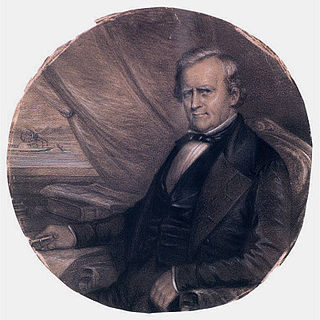Related Research Articles

A steamboat is a boat that is propelled primarily by steam power, typically driving propellers or paddlewheels. The term steamboat is used to refer to small steam-powered vessels working on lakes, rivers, and in short-sea shipping. The development of the steamboat led to the larger steamship, which is a seaworthy and often ocean-going ship.

Henry Miller Shreve was an American inventor and steamboat captain who removed obstructions to navigation of the Mississippi, Ohio and Red rivers. Shreveport, Louisiana, was named in his honor.

Sultana was a commercial side-wheel steamboat which exploded and sank on the Mississippi River on April 27, 1865, killing 1,164 people in what remains the worst maritime disaster in United States history.

A houseboat is a boat that has been designed or modified to be used primarily for regular dwelling. Most houseboats are not motorized, as they are usually moored or kept stationary, fixed at a berth, and often tethered to land to provide utilities. However, many are capable of operation under their own power.

Belle of Louisville is a steamboat owned and operated by the city of Louisville, Kentucky, and moored at its downtown wharf next to the Riverfront Plaza/Belvedere during its annual operational period. The steamboat claims itself the "most widely traveled river steamboat in American history." Belle of Louisville's offices are aboard Mayor Andrew Broaddus, and also appears on the list of National Historic Landmarks.

Bed of Roses is a 1933 pre-Code romantic comedy film co-written and directed by Gregory La Cava and starring Constance Bennett. The picture was released by RKO Radio Pictures with a supporting cast featuring Joel McCrea and Pert Kelton.
Ben Lucien Burman was an American author and journalist born in Covington, Kentucky. He also fought in both World War I and World War II, and graduated from Harvard University. He was married to Alice Caddy who illustrated many of his children's books, including his most popular books, the Catfish Bend series, which became popular with both children and adults. The series, set in Catfish Bend, Mississippi, tells a tale of the many animal residents of Catfish Bend. It was published in eleven languages.

The Great Loop is a system of waterways that encompasses the eastern portion of the United States and part of Canada. It is made up of both natural and man-made waterways, including the Atlantic and Gulf Intracoastal Waterways, the Great Lakes, the Erie Canal, and the Mississippi and Tennessee-Tombigbee Waterway. The entire loop stretches about 6,000 miles (9,700 km).

The National Mississippi River Museum & Aquarium is a museum located in Dubuque, Iowa, USA. The museum is a property of the Dubuque County Historical Society, which also operates the Mathias Ham Historic Site. The museum has two buildings on its riverfront campus: the Mississippi River Center and the National River Center. The museum originally opened as the Fred W. Woodward Riverboat Museum on July 18, 1982 before being expanded and re-organized into its current form.

Natchez has been the name of several steamboats, and four naval vessels, each named after the city of Natchez, Mississippi or the Natchez people. The current one has been in operation since 1975. The previous Natchez were all operated in the nineteenth century, most by Captain Thomas P. Leathers. Each of the steamboats since Leathers' first had as its ensign a cotton bale between its stacks.

Joseph Throckmorton was an American steamboat builder and captain during the 19th century. He was born in Monmouth County, New Jersey, and first worked in a mercantile business. His first steamboat was Red Rover, purchased on the Ohio River around 1830. In 1832 he built and skippered the steamboat Warrior. The vessel and Captain Throckmorton played a key role in the decisive battle of the 1832 Black Hawk War. Following the war, he built and owned several more steamboats, and worked for a short time as an insurance representative in St. Louis. Throckmorton died in December 1872 while employed by the United States government.

Indiscreet is a 1931 American pre-Code comedy film directed by Leo McCarey and starring Gloria Swanson and Ben Lyon. The screenplay by Buddy G. DeSylva, Lew Brown, and Ray Henderson, based on their story Obey That Impulse, originally was written as a full-fledged musical, but only two songs – "If You Haven't Got Love" and "Come to Me" – remained when the film was released. The film is available on DVD.

Many steamboats operated on the Columbia River and its tributaries, in the Pacific Northwest region of North America, from about 1850 to 1981. Major tributaries of the Columbia that formed steamboat routes included the Willamette and Snake rivers. Navigation was impractical between the Snake River and the Canada–US border, due to several rapids, but steamboats also operated along the Wenatchee Reach of the Columbia, in northern Washington, and on the Arrow Lakes of southern British Columbia.

Steamboats on the Columbia River system were wrecked for many reasons, including striking rocks or logs ("snags"), fire, boiler explosion, or puncture or crushing by ice. Sometimes boats could be salvaged, and sometimes not.

Steamboat Round the Bend is a 1935 American comedy film directed by John Ford, released by 20th Century Fox and produced by Fox Film Corporation, based on the 1933 novel of the same name by author Ben Lucien Burman. It was the final film made by star Will Rogers and was released posthumously, a month after he was killed in an airplane crash on August 15, 1935.

New Orleans was the first steamboat on the western waters of the United States. Her 1811–1812 voyage from Pittsburgh, Pennsylvania, to New Orleans, Louisiana, on the Ohio and Mississippi rivers ushered in the era of commercial steamboat navigation on the western and mid-western continental rivers.

Seventy-Six was an unincorporated community in Brazeau Township in eastern Perry County, Missouri, United States. It was located fourteen miles east of Perryville, ninety miles south of Saint Louis, and lay directly on the Mississippi River.
Tunica Lake is an oxbow lake located in Lee County, Arkansas and Tunica County, Mississippi. The Arkansas-Mississippi border follows the center of the narrow, curving lake.

Alice was a stern-wheel driven steamboat that operated on the Willamette and Columbia rivers in the 1870s and 1880s. Alice was the largest vessel built above Willamette Falls and was considered in its day to be the "Queen of the River". This steamer was rebuilt after near-destruction in a fire at Oregon City, Oregon in May 1873. In 1876, it was withdrawn from the upper Willamette River and transferred to the Columbia River, where it was worked as a towboat moving ocean-going ships to and from Portland and Astoria, Oregon, near the mouth of the Columbia River.

Callie M. Leach French was an American steamboat captain and pilot. For much of her career as a captain, she worked with her husband, towing showboats along the Ohio, Monogahela and Mississippi Rivers. She played the calliope, cooked, sewed, and wrote jokes for the showboat theater. She never had an accident in her career and was the first woman to hold a masters and pilot's license for a steamboat.
References
- ↑ Hall, Mordaunt (December 19, 1931). "MOVIE REVIEW: Impressive Version of "Mississippi" (1931)". The New York Times.